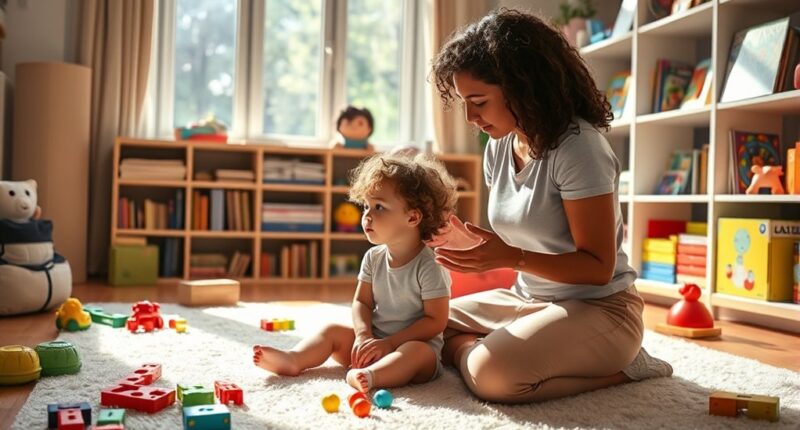Many believe only children struggle socially or become overly dependent, but with proactive efforts, you can nurture strong social skills and independence. Focus on creating opportunities for your child to interact with peers through playdates, extracurriculars, and community activities. Encourage problem-solving at home and set routines that promote emotional stability and resilience. If you keep exploring proven strategies, you’ll find plenty of ways to support your child’s growth into a confident, socially adept individual.
Key Takeaways
- Proactive social opportunities, like playdates and extracurriculars, effectively develop social skills in only children.
- Early routines and independence tasks foster resilience and self-reliance, countering myths of social awkwardness.
- Siblings are not essential; meaningful peer interactions outside the family promote social competence.
- Creating a nurturing environment with diverse experiences encourages emotional growth and social confidence.
- Myths about dependency are false; with intentional efforts, only children can thrive socially and emotionally.

Have you ever wondered what makes raising an only child unique? Unlike children with siblings, an only child often interacts with peers differently, which can influence their social development. You might worry that without siblings at home, your child won’t develop strong peer relationships or learn essential independence skills. But the truth is, with intentional effort, you can foster healthy social connections and independence, even without siblings.
When it comes to peer relationships, your child has plenty of opportunities to build meaningful friendships outside the family. They tend to be more focused on their friends because they don’t have siblings to compete with or share attention. This can actually help them develop strong social skills, like empathy, cooperation, and conflict resolution, as they navigate interactions with a variety of peers. The key is providing ample chances for socialization—whether through playdates, extracurricular activities, or community events. By encouraging your child to engage with others regularly, you help them learn how to communicate effectively, resolve disagreements, and develop confidence in social settings.
Independence skills are another area where raising an only child presents both challenges and advantages. Without siblings to share responsibilities or rely on for companionship, your child often learns to entertain themselves and solve problems independently from an early age. This can foster a strong sense of self-reliance, as they’re accustomed to managing tasks on their own. However, it’s also important to strike a balance—encouraging independence without making your child feel isolated or overwhelmed. You can do this by giving them responsibilities at home, encouraging decision-making, and supporting their efforts to try new things without overly stepping in. Over time, these experiences help your child develop resilience and confidence, essential qualities for facing life’s challenges.
Additionally, understanding typical newborn sleep patterns and establishing routines early on can help create a peaceful environment conducive to good sleep habits. It’s a common misconception that only children are destined to be socially awkward or overly dependent. The reality is, your proactive efforts can shape your child’s social and independence skills positively. Creating opportunities for peer interactions, nurturing their ability to solve problems independently, and supporting their unique personality will help them thrive both socially and emotionally. Remember, raising an only child isn’t about compensating for what siblings might provide; it’s about providing a rich environment filled with opportunities for growth. With intentional guidance, your child can develop the social skills and independence needed to navigate the world confidently, regardless of their sibling status.

Who What Why Conversation Cards for Kids – Learning Game for Social Skills, Emotional Intelligence & Critical Thinking – Speech Therapy Resources, Sequencing Game & Articulation Materials, Ages 4+
DEVELOP EMOTIONAL & SOCIAL INTELLIGENCE – Who What Why conversation cards for kids use friendly illustrations of real-life…
As an affiliate, we earn on qualifying purchases.
As an affiliate, we earn on qualifying purchases.
Frequently Asked Questions
How Does Being an Only Child Affect Emotional Development?
Being an only child can influence your emotional development by shaping your emotional resilience and how you handle peer comparison. Without siblings, you might develop stronger independence and self-awareness, but you could also feel more pressure to meet expectations. Peer comparison might be more intense, affecting self-esteem. However, with positive social experiences, you can build emotional strength and resilience that help you navigate relationships and challenges confidently.
What Are Best Practices to Encourage Social Skills in Only Children?
Imagine planning a weekend playdate where your child practices peer interactions. To encourage social skills, you can set up regular playdates, promoting cooperation and sharing. Role-playing games help them navigate conflicts, while observing their interactions provides insight. Consistent opportunities for peer interactions build confidence, and guiding them through social cues enhances communication. These practices foster essential social skills, making your child comfortable and capable in various social settings.
Are There Specific Activities to Help an Only Child Make Friends?
To help your child make friends, consider organizing regular playdates and coordinating them with other parents. Enrolling your child in extracurricular activities like sports, art classes, or music lessons also encourages social interaction. These activities give your child opportunities to build friendships naturally. By actively facilitating playdates and choosing engaging activities, you create a supportive environment where your child can develop essential social skills and form meaningful connections.
How Do I Prevent My Only Child From Feeling Lonely?
Think of loneliness as a seed you can nurture away. To prevent your child from feeling isolated, encourage regular peer interaction through playdates and group activities. Create sibling simulation opportunities, like shared chores or games, to build social skills. Stay actively involved in their social life, offering guidance and reassurance. This way, you plant the roots of friendship and confidence, helping your child thrive in a world of meaningful connections.
What Are Common Misconceptions About Raising an Only Child?
You might believe raising an only child leads to loneliness or social issues, but many misconceptions exist. Sibling stereotypes suggest only children lack social skills, yet they often excel socially. Parental overcompensation can occur, but it’s unnecessary; your child benefits from balanced attention and guidance. Remember, each child is unique, and fostering independence and social skills helps them thrive, regardless of sibling status.

Skillmatics Reusable Search & Find Book – Water Spotter, Easter Basket Stuffers, Mess-Free, Paint with Water Kits, Fun Learning Activity, Animals, Travel Toy, Gifts for Boys & Girls Ages 4, 5, 6, 7, 8
REUSABLE SEARCH & FIND ACTIVITY BOOK: Spot over 100 hidden animal-themed objects and color them to life with…
As an affiliate, we earn on qualifying purchases.
As an affiliate, we earn on qualifying purchases.
Conclusion
So, as you navigate raising your only child, remember that myths aren’t the whole story, and truths are often more nuanced. The journey might surprise you in ways you never expected—whether it’s about their independence, social skills, or future. Keep an open mind, stay flexible, and trust your instincts. But here’s the thing—there’s one secret about fostering your child’s growth that might just change everything. Are you ready to discover it?

EDUMAETRIX Animal Go Fish Card Game with Fun Facts for Kids,72 Cards, Real Photo Animal Learning Playing Cards, Memory Matching Games, 2-8 Players, Ages 4-8 and up, Old Maid and Slap Jack
Engaging Card Game: This 72-card deck offers an fun animal matching game and 72 fun animal facts for…
As an affiliate, we earn on qualifying purchases.
As an affiliate, we earn on qualifying purchases.

School Zone Connect the Dots Workbook: 32 Pages, Preschool, Kindergarten, Dot-to-Dots, Counting, Number Puzzles, Numbers 1-10, Coloring, Ages 3 to 5 (Get Ready! Book Series)
School Zone
As an affiliate, we earn on qualifying purchases.
As an affiliate, we earn on qualifying purchases.









